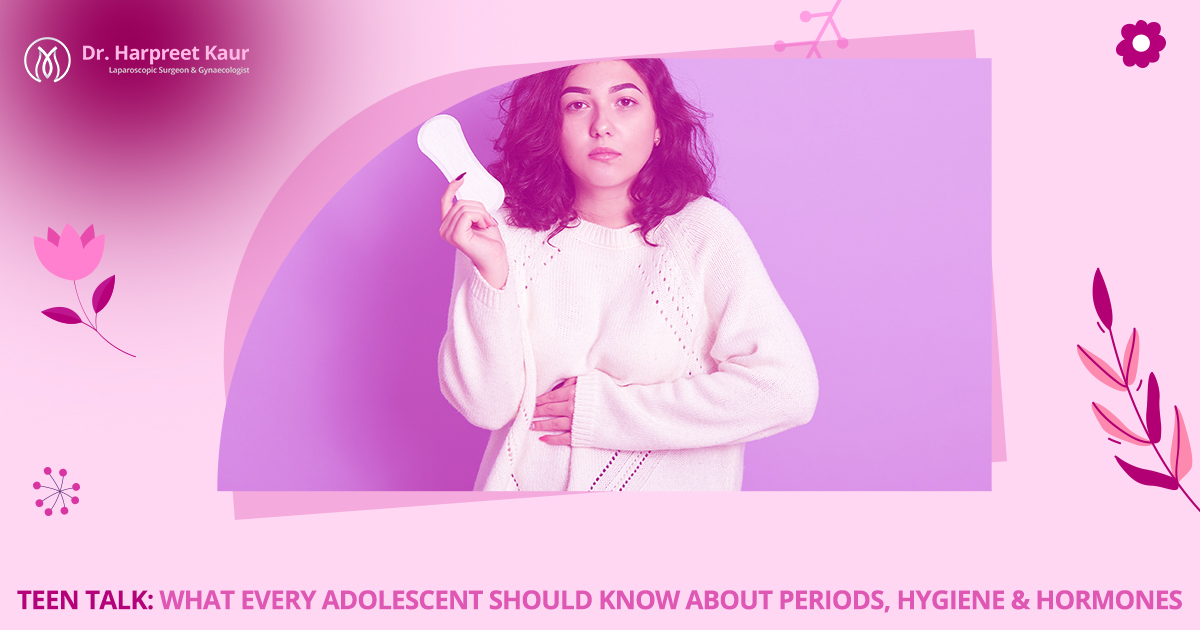Clinic Location
Care n Cure Clinic, Nayapalli, Near Hotel Crown, Bhubaneswar
For Consultation
+91 7008110200
+91 9090910009
Work Hours
Mon - Fri : 05:30 - 07:30
- Home
- About Doctor
- Services
Postnatal care
Gynaecological services
- General Consultatnt
- Adolescent Clinic
- Well Women Clicnic
- Gynaecological Surgeries
- Gallery
- Your Pregnancy
- Training
- Contact
- Feedback
- Blog
- Home
- About Doctor
- Services
Postnatal care
Gynaecological services
- General Consultatnt
- Adolescent Clinic
- Well Women Clicnic
- Gynaecological Surgeries
- Gallery
- Your Pregnancy
- Training
- Contact
- Feedback
- Blog
- Home
- About Doctor
- Services
Postnatal care
Gynaecological services
- General Consultatnt
- Adolescent Clinic
- Well Women Clicnic
- Gynaecological Surgeries
- Gallery
- Your Pregnancy
- Training
- Contact
- Feedback
- Blog
Teen Talk: What Every Adolescent Should Know About Periods, Hygiene & Hormones

Puberty is a time of growth, excitement, and confusion for many teens. With teen hormone changes shaping the body, the arrival of periods can be overwhelming if there is a lack of information and support. Open conversations around adolescent menstrual health and period hygiene tips for teens can help young girls embrace this natural phase confidently.
With guidance from specialists like Dr. Harpreet Kaur, this guide will help teens and parents navigate puberty, menstrual cycles, hygiene, and hormone changes with ease, ensuring adolescents build a healthy, informed relationship with their bodies.
Understanding Teen Hormone Changes
Puberty typically begins between ages 8-13 in girls, triggered by hormone signals from the brain to the ovaries, which start producing estrogen and progesterone.
These teen hormone changes lead to:
- Breast development.
- Growth of body hair.
- Changes in body shape.
- Emotional fluctuations.
- Onset of menstruation (periods).
Recognizing that these changes are normal helps teens feel less alone during this phase of growth.
What to Expect With Your First Period
Periods usually start two years after breast development begins. The first period, known as menarche, can be light or heavy, regular or irregular in the initial months as the body adjusts to new hormonal rhythms.
Tracking periods using a calendar or app helps monitor adolescent menstrual health and prepares teens for the next cycle, reducing anxiety and building confidence.
Period Hygiene Tips for Teens
Practicing good period hygiene tips for teens is vital for comfort, confidence, and health during menstruation. Here’s what teens should know:
1. Choosing the Right Products
- Sanitary Pads: Easy for beginners, available in various sizes for day and night.
- Tampons: Suitable for sports and swimming, but require proper insertion and frequent changes.
- Menstrual Cups: Eco-friendly and cost-effective but may take time to get used to.
2. Changing Pads or Tampons Regularly
- Change pads every 4-6 hours or sooner if heavy flow.
- Tampons should be changed every 4-8 hours to prevent infections, including toxic shock syndrome.
3. Maintain Cleanliness
- Wash the vaginal area with warm water daily; avoid harsh soaps.
- Wipe from front to back to prevent infections.
- Carry an emergency kit with pads, an extra pair of underwear, and hand sanitizer in your school bag.
4. Wear Comfortable Clothing
Loose-fitting clothes and breathable cotton underwear can help prevent irritation and discomfort during periods.
Managing Period Pain and Discomfort
Cramps, bloating, and mood swings are common during periods due to hormonal changes. Teens can manage these discomforts by:
- Using a hot water bag on the lower abdomen.
- Doing light exercises or stretches.
- Eating a balanced diet with fruits, vegetables, and whole grains.
- Drinking enough water to reduce bloating.
- Getting sufficient sleep and rest during heavy flow days.
If pain becomes severe or periods are excessively heavy, consulting a specialist like Dr. Harpreet Kaur ensures the evaluation of any underlying issues affecting adolescent menstrual health.
When to Seek Medical Advice
While irregular periods are common initially, certain symptoms require medical attention:
- Periods that last more than 7 days.
- Extremely heavy bleeding (soaking a pad every hour).
- Severe cramps not relieved by home care.
- Periods occurring less than 21 days apart or more than 45 days apart consistently.
- Signs of infection like foul-smelling discharge, fever, or rash.
Early guidance ensures prompt care and prevents future reproductive health concerns.
Building a Positive Mindset Around Menstruation
Periods are a sign of good reproductive health and a natural part of growing up. It’s important for teens to:
- Talk openly about their concerns with parents, guardians, or healthcare providers.
- Understand that mood changes are linked to teen hormone changes and will stabilize over time.
- Avoid feeling ashamed of their periods; it is a normal and healthy process.
Creating a period-friendly environment at home and school helps adolescents embrace adolescent menstrual health with confidence and ease.
Supporting Emotional Health During Teen Hormone Changes
Hormonal fluctuations during puberty can lead to mood swings, anxiety, and low moods. Encouraging teens to:
- Share their feelings with family or a trusted friend.
- Engage in hobbies and light exercise for emotional well-being.
- Avoid excessive screen time and prioritize restful sleep.
If emotional challenges persist, seeking guidance from healthcare providers like Dr. Harpreet Kaur can help address hormonal imbalances or mental health concerns during adolescence.
Conclusion
Adolescent menstrual health is a crucial aspect of growing up, and understanding periods, hygiene, and teen hormone changes helps young girls navigate puberty with confidence and dignity. Following period hygiene tips for teens ensures comfort and health while developing a positive relationship with their body.
With guidance from experts like Dr. Harpreet Kaur, parents and teens can work together to build an informed, supportive environment, empowering adolescents to thrive beyond puberty with confidence and knowledge.

